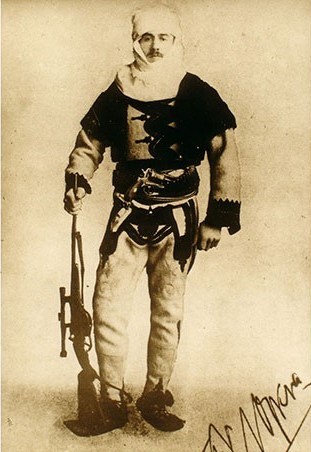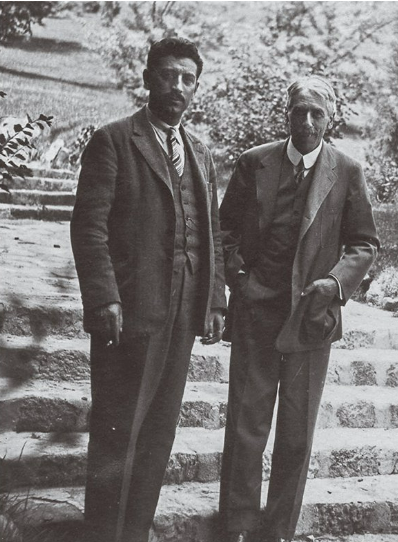This month, in celebration of PRIDE and BIAZA Generations of Pride, we are giving space to LGBT+ voices from across the BIAZA membership. The PRIDE blogs will provide a snapshot of the experiences of LGBT+ people working in the zoo sector and highlight diversity across the animal kingdom too.
Journeying back generations to uncover individuals of the LGBTQIA+ community in the world of science and zoology brought up known figures such as Alexander von Humboldt, Louise Pierce and Sara Josephine Baker[i]. Delving into the archives of ZSL’s history however, drew a lot of blanks. Then, there he was: strutting into ZSL’s 1907 Proceedings (now Journal of Zoology) with theories that birds evolved from bipedal dinosaurs in a paper entitled “Ideas of the Origin of Flight”[ii] In his finest Albanian garments came the Hungarian Baron turned palaeontologist, Franz Nopcsa (1877 – 1933).
The Austro-Hungarian aristocrat’s interest in dinosaurs began when he discovered fossils with his sister on their vast family estate in Transylvania. There, Nopcsa unearthed unusually small dinosaur bones, many of them sauropods, which eventually led to his discovery of evidence of dwarfism in dinosaurs. The giants of Brontosaurus and Diplodocus suddenly had relatives like the Magyarosaurus that stopped growing at five metres instead of twenty-five. This was due to isolated island living in the late Cretaceous period when sea levels were high and resources and predators were low, so larger sauropods could safely adapt to be smaller. Nopcsa was pioneering in his research in how dinosaurs lived and the impact of the environment on their biology and is now often described as “the father of modern palaeobiology”[iii].
 But his life outside of analysing fossils was just as interesting. In 1903, Franz Nopcsa left his castle home and set out across Eastern Europe to further his studies and interests. In 1906, he met Albanian peasant and author Bajazid Doda, the man destined to become his long-term partner. On the surface, Doda worked as Nopcsa’s secretary, but Nopcsa’s wealth and status gave him confidence to be candid about their romantic relationship. In his memoirs Reisen in den Balkan (“Travels in the Balkans”), he describes Doda as “…the only person who has truly loved me and in whom I had full confidence.”[iv] In a seemingly romantic gesture, Nopcsa even named a species of ancient turtle after Doda. Well, to be precise, the 70-million-year-old turtle fossil was more specifically named after one of Doda’s many… attributes. Kallokibotion bajazidi roughly translates to ‘beautiful and round Bajazid’. I’ll leave the rest to your imagination.
But his life outside of analysing fossils was just as interesting. In 1903, Franz Nopcsa left his castle home and set out across Eastern Europe to further his studies and interests. In 1906, he met Albanian peasant and author Bajazid Doda, the man destined to become his long-term partner. On the surface, Doda worked as Nopcsa’s secretary, but Nopcsa’s wealth and status gave him confidence to be candid about their romantic relationship. In his memoirs Reisen in den Balkan (“Travels in the Balkans”), he describes Doda as “…the only person who has truly loved me and in whom I had full confidence.”[iv] In a seemingly romantic gesture, Nopcsa even named a species of ancient turtle after Doda. Well, to be precise, the 70-million-year-old turtle fossil was more specifically named after one of Doda’s many… attributes. Kallokibotion bajazidi roughly translates to ‘beautiful and round Bajazid’. I’ll leave the rest to your imagination.
Nopcsa also fell in love with Doda’s home country. Exercising his cartography skills, he produced the first geological map of Northern Albania and worked as an Austria-Hungarian spy during the Balkan wars. When Albania became a newly independent country in 1912, he also made a bid to become King (unsuccessfully). To shun whispers about the possible lineage of a homosexual King and to raise extra funds for infrastructure, he even offered to sell the role of Queen “a step which under other circumstances I would have been loath to take.”[v]
 After a small stint as the head of the Hungarian Geological Institute, Nopcsa and his beloved Doda were soon back on their motorcycles, cruising through Europe searching for fossils. When the war ended, Nopcsa’s native Transylvania was ceded to Romania and his family lost their estates and possessions causing Nopcsa’s life to take a slow downward spiral. This extraordinary nomadic scientist, fell repeatedly into deep debt and even deeper depressions. He eventually had no choice but to sell most of his possessions and collections, some of which still reside within the Natural History Museum today. In a tragic end to his and Doda’s story, in 1933, after drugging Doda’s tea, Nopcsa shot him before turning the gun on himself. He attempted to justify his actions in the note he left behind: “I did not wish to leave [Doda] behind sick, in misery and without a penny, because he would have suffered too much.”[vi]
After a small stint as the head of the Hungarian Geological Institute, Nopcsa and his beloved Doda were soon back on their motorcycles, cruising through Europe searching for fossils. When the war ended, Nopcsa’s native Transylvania was ceded to Romania and his family lost their estates and possessions causing Nopcsa’s life to take a slow downward spiral. This extraordinary nomadic scientist, fell repeatedly into deep debt and even deeper depressions. He eventually had no choice but to sell most of his possessions and collections, some of which still reside within the Natural History Museum today. In a tragic end to his and Doda’s story, in 1933, after drugging Doda’s tea, Nopcsa shot him before turning the gun on himself. He attempted to justify his actions in the note he left behind: “I did not wish to leave [Doda] behind sick, in misery and without a penny, because he would have suffered too much.”[vi]
In death, he and Doda were laid to rest in Vienna and buried at exactly the same moment. Nopcsa’s incredible discoveries and colourful life disappeared into obscurity, likely due to his brazen queer identity, misunderstood mental health struggles, and the sad circumstances around his death. Today, we remember Franz Nopcsa for his innovative research and extraordinary life.
Maddie Humfryes (she/they) - Visitor Activities Officer, Whipsnade Zoo
Many thanks to Ann Sylph, Emma Milnes and Ruby Constable for their assistance.
[i] Queer Scientists of Historical Note – NOGLSTP is Out to Innovate
[ii] https://zslpublications.onlinelibrary.wiley.com/doi/epdf/10.1111/j.1096-3642.1907.tb01811.x
[iii] Franz Nopcsa: the dashing baron who discovered dwarf dinosaurs | Natural History Museum (nhm.ac.uk)
[iv] The Photo Collection of Bajazid Doda (albanianphotography.net)
[v] Franz Nopcsa von Felső-Szilvás - Wikipedia
[vi] Halloween special VI: Baron Nopcsa and the dinosaurs of Transylvania | Letters from Gondwana. (wordpress.com)
Other sources used:
Franz Nopcsa - Linda Hall Library
History Forgot This Rogue Aristocrat Who Discovered Dinosaurs and Died Penniless | History| Smithsonian Magazine
The Life and Legacy of the Dinosaur Baron - Scientific American
Meet Natural History Hero Franz Baron Nopcsa von Felso-Szilvas - The Pink Triangle Trust
All blogs reflect the views of their author and are not a reflection of BIAZA's positions.
Related Members
-
News
.png?w=100&h=100&zc=1&f=jpeg&hash=97e6d151315c515d23f80e6ee9d1d533) Love is in the air as pygmy marmoset Tumble arrives at Shaldon Wildlife Trust 13th February, 2026Shaldon Wildlife Trust is celebrating a very small but very special love story this Valentine’s season with the arrival of a new female pygmy marmoset…
Love is in the air as pygmy marmoset Tumble arrives at Shaldon Wildlife Trust 13th February, 2026Shaldon Wildlife Trust is celebrating a very small but very special love story this Valentine’s season with the arrival of a new female pygmy marmoset… -
News
.png?w=100&h=100&zc=1&f=jpeg&hash=65ba18ab3dddd57e0f31f999ec4849db) Double baby joy at Paignton Zoo as second rare white monkey born 11th February, 2026Paignton Zoo is celebrating a rare double baby boom after welcoming a second endangered king colobus monkey this winter, marking the zoo’s first…
Double baby joy at Paignton Zoo as second rare white monkey born 11th February, 2026Paignton Zoo is celebrating a rare double baby boom after welcoming a second endangered king colobus monkey this winter, marking the zoo’s first… -
News
.png?w=100&h=100&zc=1&f=jpeg&hash=92e90cf6a944ad40ff665483a5744aa4) Blog: Zoos have a duty to source their plants sustainably 10th February, 2026Do you know where your purchased plants come from? In our latest blog, the BIAZA Plant Working Group details how zoos/aquariums can work together…
Blog: Zoos have a duty to source their plants sustainably 10th February, 2026Do you know where your purchased plants come from? In our latest blog, the BIAZA Plant Working Group details how zoos/aquariums can work together…



